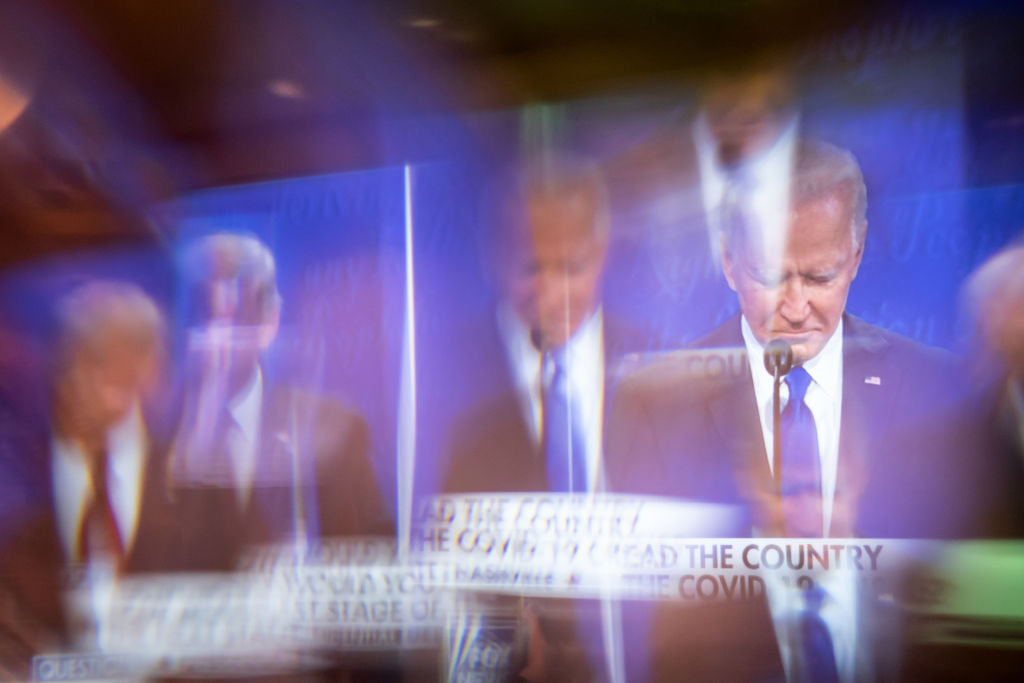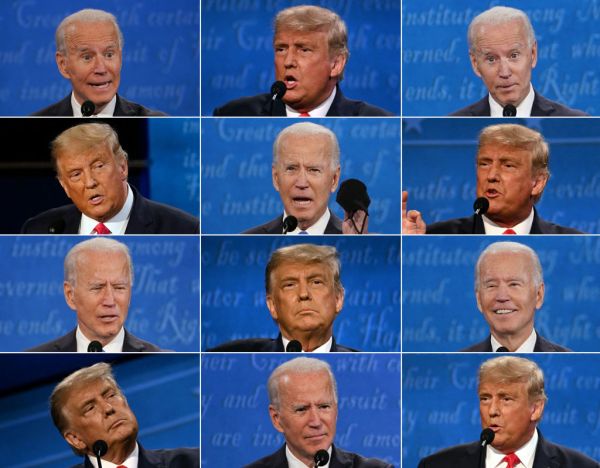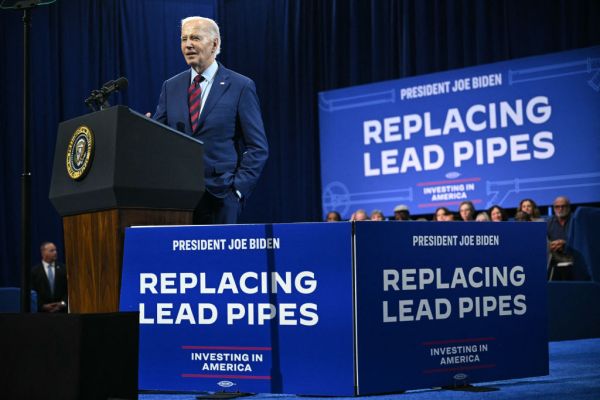We’re not going to dwell today on the “unified Reich” video that was posted on Monday to Donald Trump’s social media account. But we should spend a little time on it, if only to reflect on the choices We, As A People, have made to lead us to this point.
Presidential elections didn’t used to have “unified Reich” news cycles, you know.
Analysis of the video, which was created by a user and amplified by the campaign, suggests there’s less to the choice of phrase than meets the eye. For one thing, it’s not a reference to that Reich. It’s taken from a Wikipedia entry about World War I: “German industrial strength and production had significantly increased after 1871, driven by the creation of a unified Reich.”
Nor is it clear that the person who made the video chose the term advisedly. It appears to be placeholder text from stock footage of a newspaper, notes Philip Bump at the Washington Post. Even if the clip’s creator did deliberately highlight the phrase, I can believe that the Trump staffer who reposted it didn’t notice the “Reich” text. I didn’t notice it myself, as it’s hard to read.
And if we assume the worst about the intentions of all involved, this still wouldn’t qualify as the most blatant celebration of Nazism in a video posted by a Republican presidential candidate over the past year.
As I say: We, As A People, have much to answer for.
Partisan Republicans will digest all of that and conclude that this controversy is a typical election-year smear from the louts in the liberal Democrat-media complex. And that’s sort of true, as the Biden campaign is eagerly milking it for all it’s worth today. Joe Biden wasn’t above smearing Mitt Romney, the Good Republican, for supposedly harboring a secret pro-slavery agenda in 2012. Why, then, those partisans will ask, should we take him seriously on the subject of Donald Trump’s alleged aspirations to build a “unified Reich”?
But that’s disingenuous, as most defenses of Trump are. They know the answer.
Mitt Romney didn’t try to overturn the election that he lost. He doesn’t speak in the vernacular of strongmen. He doesn’t treat personal loyalty to him as a supreme political virtue. He doesn’t physically intimidate his opponents or nudge supporters to do so on his behalf. And he doesn’t babble endlessly about “law and order” while demanding an absolute exemption for himself.
We all know Trump’s personality type from history. One needn’t go full Godwin to grasp that reelecting him would expand the Overton window in dark, previously imponderable post-liberal ways. Some of his fans seem to be counting on it, in fact. The “Reich” clip resonates because no one knows how far he might go.
Anything is possible if he’s reelected. How much might that dawning realization matter on Election Day?
A great irony of this campaign is that we’ve never known more about our two choices and yet there’s never been less certainty about how each might govern in a second term.
Both candidates have been president. We don’t need to wonder, as we usually do, how one or both might behave in office if elected. We know. We’ve seen it. Not since 1892 has that been true.
We have all the information we need. But somehow we don’t know anything.
Take Joe Biden. There are three scenarios for how his second term might play out and by far the least likely is “more or less the same as this term.” The president could, theoretically, maintain his current degree of cognitive function all the way to January 2029 but no one would bet heavily on that. The likelier scenarios are that he’ll die in office, elevating a vice president in whom no one but diehard Democrats has much confidence, or he’ll slowly wither on the vine mentally for four years.
What would it mean to have a leader who’s forced to retreat from the public spotlight because he can no longer hide the evidence of serious deterioration? Would his Cabinet invoke the 25th Amendment? Would Jill Biden quietly run the country from behind closed doors? What effect would his incapacitation have on foreign policy in China and Russia?
Those are grave questions, but we’ll have no answers before Election Day. Reelecting Biden means swan-diving into a void of uncertainty.
Reelecting Trump, on the other hand, means … swan-diving into a void of uncertainty.
He’s awfully old too, remember. He might be starting from a higher baseline of cognitive fitness than Biden but some withering on the vine is inevitable by the time he turns 82 in 2028. Or so we should hope, as a Trump who remains energetic is destined to indulge his authoritarian passions by forcing the country into God knows how many constitutional crises. What would those look like? How crazy would he get? Would the military be involved?
That’s a different kind of uncertainty than the uncertainty around Biden. But it’s on voters’ minds.
Joshua Green published a piece at Bloomberg News on Tuesday about anxiety over Trump’s illiberalism mounting among voters in focus groups conducted by political pros. In particular, many worry that he might connive to try to stay in office as his second term winds down regardless of what the 22nd Amendment has to say about it.
Seiji Carpenter, vice president at David Binder Research, noticed this fear in early April while conducting focus groups of people who had voted for Biden in 2020 but became disillusioned and were considering switching sides. “We were talking to Latino men and Asian American-Pacific Islander women in battleground states,” Carpenter recalls, “and they went straight to the issue of, what if Trump won’t give up power?”
…
“Typically, when we raise concerns about a candidate’s agenda, people are skeptical and want to do their own research first or think it’s an attack,” says Carpenter, the focus group director. “With Trump, that’s not true. Voters believe that he would try to remove term limits, and they’re nervous about what’s possible.”
“They’re nervous about what’s possible.” You can’t do better than that in summing up the mood of the American electorate.
One liberal group told Green that it asked 1,500 voters across battleground states to rank two dozen Trump statements by how concerning they are. Top choices were when he spoke about being a “dictator on day one” and when he grumbled about “terminating” parts of the Constitution in order to redress the, ahem, rigged election of 2020. It’s not “mean tweets” that have voters nervous, as much as partisan Republican hacks often like to pretend that that’s the full extent of his unfitness for office.
Interestingly, Carpenter suspects that something more than his authoritarian musings might be putting Americans on edge. “The dimensions of what constitutes a credible threat have expanded because of Roe,” he claimed. “Since that decision, you hear voters talking themselves out of the notion that an idea is too far-fetched.” It would be ironic if the greatest victory of Trump’s presidency for traditional conservatives, which empowered the people to set abortion policy for themselves, ended up being held against him by voters as circumstantial evidence of his anti-democratic, post-liberal potential.
But you can understand the reasoning. If Trump was willing to move the Overton window radically on a constitutional right like abortion, one might think, he’ll be willing to move it radically with respect to constitutional restraints on his own power. He already moved it pretty darned radically with the autogolpe he attempted after the 2020 election; the next logical step if he wins again will be to start testing public resistance to a third presidential term, a prospect at which he’s already begun winking.
Between his autocratic impulses, his enabling of policies like abortion bans that many Americans used to find unthinkable, and his hair-raising vagueness on other issues of the moment …
… you can imagine the immense uncertainty of his second term weighing ever more heavily on undecideds as the campaign progresses. Instead of “Am I better off than I was four years ago?”, the question that decides the election might be, “Which candidate will cause me less anxiety in a second term?”
Call that “the jitter factor” in this campaign.
At the moment, the jitter factor seems to be working more strongly against Biden than against Trump.
Last week Aaron Blake noted that a key dynamic of the 2020 race has now reversed itself. Whereas four years ago more voters said there was no chance they’d vote for Trump than said so of Biden, now it’s the other way around. In fact, in two different polls dating back to November, those who say there’s no chance they’ll vote for Biden not only outnumber those who say the same of Trump, their ranks are growing.
For now, it’s Biden more so than Trump whose second term augurs chaos. Jitters about inflation, interest rates, and instability abroad are compounding the uncertainty about his basic ability to function in a second term. Trump seems a slightly safer bet by comparison—but the uncertainty about his second term means voters would be wise to hedge their bets somehow. And they seem to know it.
No wonder, then, that Democrats down ballot continue to perform surprisingly well in polling.
We talked a bit about ticket-splitting in March but it’s worth revisiting the topic here. Feast your eyes:
Seeing a progressive Democrat 13 points ahead of a conspicuously Trumpy Republican in Arizona might lead you to assume that Trump must also be underperforming there, but you’d be wrong. He’s 5 points up on Biden in the same poll with an outright majority of the vote at 52 percent.
The New York Times battleground poll that made waves last week also detected some divergence between the top of the ballot and the bottom. Trump led in five of the six swing states surveyed while Democrats led in three of the four competitive Senate races in the same states. It’s the same story in the RealClearPolitics average: Trump is ahead in all seven battlegrounds being tracked but Biden’s party leads on the generic ballot and in all of the marquee Senate races, including deep red Ohio and Montana.
Maybe Democratic incumbents are benefiting from a simple and temporary name-recognition advantage. Or maybe there really is a meaningful shift toward Trump and/or away from Biden among nonwhite voters that’s not being replicated in less prominent contests. Or maybe this is a case of “the jitter factor” at work, with voters tilting toward Trump due to greater anxiety about Biden while worrying about what abuses he might get up to in his next term without a Democratic Congress in place to check him. Those jitters could be insulating Biden’s party down ballot from the president’s unpopularity, potentially helping them flip the House and minimize losses in the Senate.
It could also be setting us up for a major polling error that may or may not end in a surprise Biden victory.
Many liberals on social media (and in the White House!) have talked themselves into believing that there’s something janky about polling this year. They’re in denial about that right now, driven mad by grief and horror that this country might reelect someone who had no business being elected to begin with, but it’s easy to imagine a scenario in which they turn out to be correct.
It’s this simple: No one wants to admit that they’re voting for Joe Biden. It’s embarrassing! Many liberals and independents believe that his brain has turned to oatmeal. Progressives are aghast that he continues to support Israel’s war in Gaza. No one outside the immediate Biden family is enthusiastic about a second term, and even Jill probably has her moments of doubt.
When a pollster calls them up, a meaningful number of potential Biden voters might be answering that they won’t support him this year. They might even mean it in the moment, as they’re confronted every day by his failings in news reports. But eventually they’re going to start thinking about the other guy. They’ll stare into the void of uncertainty and see no bottom. The jitter factor will begin to mess with their heads.
They’ll go into the booth on Election Day sincerely not knowing what to do, having told pollsters all year long that they’ll never vote for Biden. And then they’ll vote for Biden.
That’s the entire Democratic theory of the election, in fact. The president and his party have gambled the stability of the country on their belief that, with a gun to their heads, Americans will choose a diminished liberal over a knock-off Mussolini. The jitter factor will blossom into a full-blown panic attack on November 5 and the president will be reelected by a shockingly comfortable margin, defying expectations.
That would be a better outcome than Trump winning but it would still be very bad insofar as Republicans have no intellectual framework for processing an unexpected Trump defeat. The polling said he would lose in 2020 and he nearly won; that was enough to rally most of his party behind a coup attempt based on a theory of election-rigging that lacked any serious evidence to support it. If he loses again this time after the polling said he would win, God only knows what sort of destructive tantrum about “cheating” the American right will collectively throw.
But they shouldn’t be surprised if it happens. The jitter factor, reflecting an unusual degree of uncertainty about the candidates, logically means we should expect an unusual degree of uncertainty about the outcome in November. And that goes both ways: Trump winning the Electoral College comfortably because swing voters feared in the end that Biden is a vegetable is very much on the table this fall.
There’s an obvious way for Trump to reduce his risk from the jitter factor, but good luck getting him to do it.
Actually, there are two ways. And he’s done okay with one of them, in fairness.
Specifically, he’s begun moderating on policy to whatever extent is politically feasible. If it’s true that voters are treating the end of constitutional abortion rights as a proxy for how radically he might challenge the constitutional order, then he should obviously reposition as a centrist on that issue as best he can.
And he has, sort of. He won’t sign any federal abortion restrictions, he’s said. He also won’t try to “terminate” Obamacare. He believes Ukraine’s security is an “important” U.S. interest. He’s made some ambivalent noises about Gaza too, although less so lately. The message to voters in all that is that, with a few exceptions, they shouldn’t fear any policy radicalism from him in a second term. The days of undoing broadly popular programs like the Roe scheme on abortion are over. No need to feel anxious and uncertain!
That should help ease the jitter factor working against him. But what would really ease it is if he betrayed any sense that he understands voters’ civic misgivings about him and is keen to win back their confidence. He’s learned his lesson from 2020, he might say. He’s a new man! From now on, you can trust him to be a responsible steward of the constitutional order.
That one’s a bit of a problem.
It’s strange to think of a liar as habitual as Trump struggling to say something that he doesn’t believe when he has every reason to believe he’d benefit from doing so, but that’s the case with his “rigged election” nonsense. His ego simply will not allow him to say, “Biden won in 2020 and I’m going to beat him like a drum in 2024.” Look no further than the interview he gave to a news affiliate in Pennsylvania today, where he couldn’t resist rambling about the alleged unfairness that happened there four years ago despite the interviewer’s best efforts to correct him.
It’s entirely in his interest to reassure swing voters that he’s no longer in the grip of authoritarian madness. He can’t do it.
It’ll be like that for the rest of the campaign, including at the two debates with Biden. He’ll be handed one opportunity after another to reassure jittery voters that he’s somewhat less crazed than he was the last time they paid him any attention for an extended period of time. And he’ll fail every time.
And so, as much as I often think the Democrats’ “threat to democracy” messaging about him is overexposed and already priced into his polling, it’s plausible that Trump himself over the course of the campaign will end up convincing undecided voters that they’re not taking those concerns seriously enough. He hasn’t learned a thing; he’s not sorry for what he did; they frankly should be anxious and uncertain about how far he might go if they’re foolish enough to give him a second chance at power.
Biden can’t win the election at this point but Donald Trump, bless his heart, can lose it—and just might. If he does, it’ll be because he managed to persuade Americans that having a president who’s apt to be catatonic by the time he leaves office wasn’t the worst that they could do.










Please note that we at The Dispatch hold ourselves, our work, and our commenters to a higher standard than other places on the internet. We welcome comments that foster genuine debate or discussion—including comments critical of us or our work—but responses that include ad hominem attacks on fellow Dispatch members or are intended to stoke fear and anger may be moderated.
With your membership, you only have the ability to comment on The Morning Dispatch articles. Consider upgrading to join the conversation everywhere.